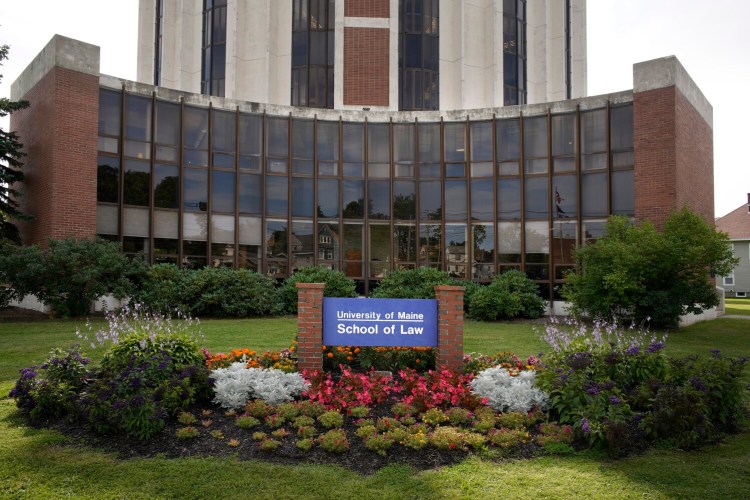Trustees of the University of Maine System on Monday approved a reorganization of the University of Maine School of Law in an effort to grow enrollment, provide more relevant academic programming and improve its financial standing.
The board also took another step toward changing the name of the University of Southern Maine and moved to adopt a systemwide approach to accreditation.
The law school changes, which will take place immediately, gained unanimous approval from the board.
They include budget independence from the University of Southern Maine and the ability for the dean of the law school to report directly to the university chancellor, a responsibility usually reserved for campus presidents.
“We’ve moved swiftly to resolve some of the issues at the law school,” Chancellor Dannel Malloy said during a board of trustees meeting at the University of Maine at Fork Kent.
He added that other changes already implemented include a 3 percent pay increase for faculty – the first pay increase in five years – and the search for a new director of academic success.
The changes come on the heels of a report that recommended sweeping reforms at the law school, which in recent years has struggled with budget deficits and operational challenges.
The report released in July said the school relied too heavily on scholarships and financial aid to attract students, and documented problems such as an increasing reliance on adjunct professors at the expense of tenured faculty, a lack of adequate fundraising and a need to expand and diversify course offerings.
It also documented budget shortfalls that in recent years have been met by drawing on funds from the university system and the University of Southern Maine, which shares a campus with the law school and previously had channeled state funds to the law school.
Under the reorganization, the law school would transition to direct funding from the university system over a two-year period and would have more direct interaction with the chancellor and board of trustees. The changes come as the school is about to launch a search for a new dean.
“In my opinion it would be impossible to draw dean candidates without resolving some of the issues we’ve outlined today,” Malloy said.
James Erwin, chairman of the University of Maine System Board of Trustees, thanked the University of Southern Maine and its president, Glenn Cummings, for working with the law school on solutions.
“As we move towards a collaborative one university model, this is a terrific example of looking at a challenge as a single team and changing what we do to best serve students,” Erwin said.
In other actions, Monday, the board also gave unanimous approval to a recommendation allowing Malloy to work with campuses across the system on moving toward a statewide accreditation model.
Accreditation is the process for ensuring institutes of higher learning are meeting academic and program standards.
It is granted by a private non-governmental agency, such as the New England Consortium of Higher Education, which is the group responsible for the UMaine System’s accreditation.
Currently, five of the system’s seven campuses are accredited separately by the consortium, while the University of Maine at Machias is accredited as a regional campus of the University of Maine.
According to a report presented to the board Monday, the current system in Maine requires each institution to control its own academic programming in order to be accredited, which can make it harder to collaborate on cross-campus programming and cost-saving initiatives.
A single accreditation would allow universities to work together and help smaller campuses that have struggled with the financial burden of meeting accreditation requirements to collaborate, as is the case with Machias and the University of Maine.
According to the report, a single accreditation is estimated to save almost $800,000 over the 10-year accreditation cycle through savings on accrediting dues and review fees.
Malloy has been charged with returning to the board in November with a framework for achieving a single accreditation. The board is expected to take action in early 2020.
Finally, the board also gave unanimous approval Monday to a resolution allowing Malloy and Cummings to bring a name change for the University of Southern Maine before the Maine Legislature during the session that begins in January.
Over the last six months, Cummings has been sharing with faculty, staff, students and alumni research on changing the school’s name to the University of Maine at Portland.
The change is expected to cost the university about $1.2 million in up-front costs including new signs, sports team uniforms and a website re-design, but would attract between 80 to 100 new out-of-state students in the first year.
Cummings said the change would help the university capitalize on Portland’s popularity with both Mainers and out-of-state students and more clearly identify it as part of the public university system.
“Right now we’re the only one that doesn’t match with the rest of the system,” he said.
The board will give final consideration to the name change and seek public input at its November meeting in Farmington.
Comments are not available on this story.
Send questions/comments to the editors.



